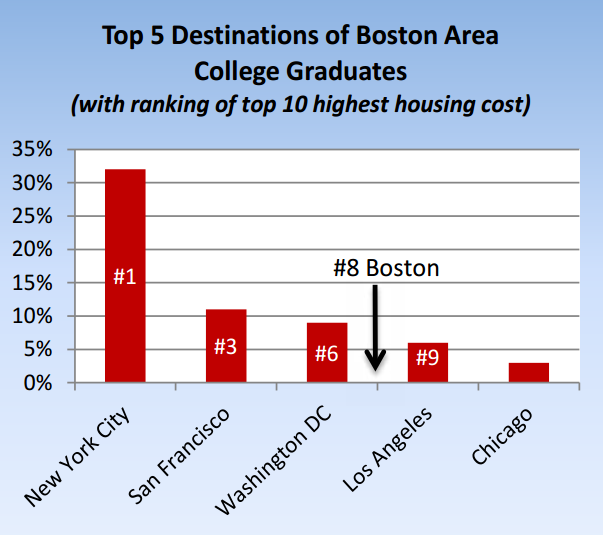Greater Boston has never had a problem attracting talent. The region’s 76 colleges and universities and almost 350,000 students virtually guarantee a steady stream of knowledge-workers-in-training. Our bigger challenge is keeping this young, educated population from leaving Massachusetts once they’ve crossed the stage and received their diplomas. Data presented from WCCP’s new Talent Magnets report show that too often we lump together all of these various reasons that push people out of the Commonwealth without regard for importance, timing, or life needs. We give each reason equal weight, which diminishes the effectiveness of our response. By breaking down talent needs into life stages, policy makers can better prioritize talent retention strategies.

First, we need to take the spotlight away from housing affordability and shine it on jobs, student integration, and lifestyle. Greater Boston loses a majority of its talent to New York City and the San Francisco Bay area, the two highest priced housing markets and cost of living ratios in the nation. Recent graduates rarely state “I chose to stay in Boston because of the housing,” rather, they choose to stay, or leave, based on the availability of a good job in their field of study. One panelist at the hearing, current Boston University student Christian Schlachte, stated quite clearly that he would stay in Boston primarily if he had a job waiting for him upon graduation. Others at the hearing echoed Mr. Schlachte’s priority: former Northeastern University student, and Pennsylvania native, Eric Ferrara credits his co-operative education program at John Hancock for integrating him into the local employment scene and keeping him in Boston for 12 years, where he is now settled and raising a family.
Of course, Mr. Ferrara’s priorities have shifted since he was a 22-year old graduate and his reasons to stay or leave the Boston area are now honed to the price of housing, the quality of public schools, and the safety of city neighborhoods for his family. But these are the needs of those who have stayed, not those who have left. When local policy makers focus strictly on these latter points – and how could they not, with the chorus of exorbitant housing costs playing on a continuous feedback loop – they miss out on the former: a quality job in a graduating student’s field that will keep them in Greater Boston in the first place. If we can’t keep young talent within the first 7 years of graduation (the time when most young talent moves), we have a smaller pool to work with later on issues related to housing and schools.
The 33 testimonies given on Thursday showcased the breadth of issues that are on the forefront of businesses, government leaders, academic, students, investors, and non-profit groups. Google’s Tarun Rathnam believes that the Boston area has plenty of great reasons, including jobs, to keep people in the area but we lack effective marketing about our assets. Ben Forman, of MassINC, and Boston City Councilor Ayanna Pressley cautioned the audience on the region’s continuing racial and growing income inequality problems. Jon Lai reiterated his recent posting on CNN Money calling for Boston to create a “lifestyle identity” that distinguishes our unique assets and will act as a talent magnet strong enough for him and his Harvard Business School classmates to stay in Massachusetts.
The time for better communication and action is now and testimony from all sectors of the Greater Boston community shows the passion for our home and our desire to make it better. Councilor Jackson repeated throughout the hearing that this is just the beginning, the first step of a dialogue that will continue into the future. Tim Rowe of the Cambridge Innovation Center noted that a step-by-step approach may be the most effective way to help keep talent in Greater Boston. “It’s the hundreds of small things that we all can do to make the region great. When someone comes to me with an idea, even a crazy idea, I say ‘how can I help?’” Thursday’s hearing made it clear that there are many ready to join our local leaders and say “how can I help?”
For more from those in attendance and to continue the conversation online, use the Twitter hashtag #masstalent.
Mike Lake and Dan Spiess are the Executive Director and Research Director for World Class Cities Partnership, an international urban research organization based at Northeastern University. Mr. Lake is also a candidate for Lieutenant Governor of the Commonwealth of Massachusetts.
